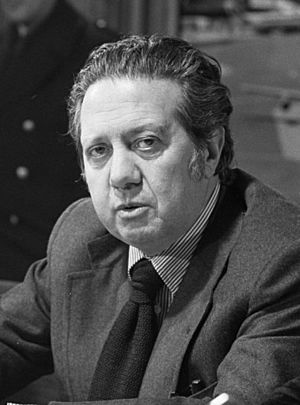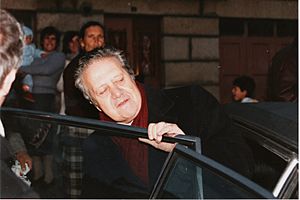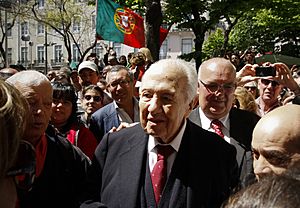Mário Soares facts for kids
Quick facts for kids
Mário Soares
GColTE GCC GColL
|
|
|---|---|
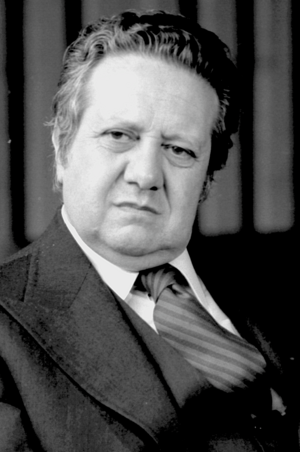
Soares in 1978
|
|
| President of Portugal | |
| In office 9 March 1986 – 9 March 1996 |
|
| Prime Minister | Aníbal Cavaco Silva António Guterres |
| Preceded by | António Ramalho Eanes |
| Succeeded by | Jorge Sampaio |
| Prime Minister of Portugal | |
| In office 9 June 1983 – 6 November 1985 |
|
| President | António Ramalho Eanes |
| Deputy | Carlos Mota Pinto Rui Machete |
| Preceded by | Francisco Pinto Balsemão |
| Succeeded by | Aníbal Cavaco Silva |
| In office 23 July 1976 – 28 August 1978 |
|
| President | António Ramalho Eanes |
| Preceded by | José Pinheiro de Azevedo |
| Succeeded by | Alfredo Nobre da Costa |
| Minister of Foreign Affairs | |
| In office 12 October 1977 – 30 January 1978 |
|
| Prime Minister | Himself |
| Preceded by | José Medeiros Ferreira |
| Succeeded by | Vítor de Sá Machado |
| In office 15 May 1974 – 26 March 1975 |
|
| Prime Minister | Adelino da Palma Carlos Vasco Gonçalves |
| Preceded by | National Salvation Junta |
| Succeeded by | Ernesto Melo Antunes |
| Minister without Portfolio | |
| In office 26 March 1975 – 8 August 1975 |
|
| Prime Minister | Vasco Gonçalves |
| Preceded by | Ernesto Melo Antunes Vítor Alves |
| Succeeded by | Jorge Campinos |
| Secretary-General of the Socialist Party | |
| In office 19 April 1973 – 29 June 1986 |
|
| President | António Macedo |
| Preceded by | Office established |
| Succeeded by | Vítor Constâncio |
| Personal details | |
| Born |
Mário Alberto Nobre Lopes Soares
7 December 1924 Lisbon, First Portuguese Republic |
| Died | 7 January 2017 (aged 92) Lisbon, Portugal |
| Resting place | Prazeres Cemetery, Lisbon |
| Political party | Socialist Party |
| Spouses | |
| Children | João Isabel |
| Alma mater | University of Lisbon Pantheon-Sorbonne University |
| Profession | Historian Lawyer Professor |
| Signature |  |
| Website | Mário Soares Foundation |
Mário Alberto Nobre Lopes Soares (born December 7, 1924 – died January 7, 2017) was an important Portuguese politician. He served as prime minister of Portugal twice. First, from 1976 to 1978, and then from 1983 to 1985. Later, he became the 17th president of Portugal from 1986 to 1996.
Mário Soares was also the first leader (secretary-general) of the Socialist Party. He led the party from when it started in 1973 until 1986. Many people see him as the "father" of Portuguese democracy. This means he played a huge role in making Portugal a free and fair country.
Contents
Who Was Mário Soares?
Soares' Family Background
Mário Soares was born in Lisbon, Portugal. His father, João Lopes Soares, started a school in Lisbon called Colégio Moderno. His mother was Elisa Nobre Baptista. Mário Soares was raised in a Roman Catholic family. However, as he grew up, he became a republican, believing in a government led by elected representatives. He also believed in secularism, which means separating government from religion, and socialism, which focuses on fairness and equality for everyone.
Early Life and Education
Soares studied history and philosophy at the University of Lisbon. He became a university teacher in 1957. However, he was often arrested because he spoke out against the dictatorship that ruled Portugal at the time. This dictatorship was led by António de Oliveira Salazar.
He was part of groups that resisted the dictatorship, like the Movement for Anti-Fascist National Unity. For a short time, one of his teachers was Álvaro Cunhal, who later became a major leader of the Portuguese Communist Party. Soares and Cunhal would become political rivals.
While at university, Soares joined the Portuguese Communist Party. He helped organize protests in Lisbon to celebrate the end of World War II. He was first arrested in 1946. Because of his political activities, he could not continue teaching history and philosophy. So, he decided to study law and became a lawyer.
Soares' Marriage and Children
Mário Soares married Maria de Jesus Barroso Soares, an actress, on February 22, 1949. They got married while he was in prison. They had two children: a son named João, who later became the Mayor of Lisbon, and a daughter named Isabel. Isabel now helps manage the Colégio Moderno, the school his father founded.
Fighting for Democracy in Portugal
Standing Up to the Dictatorship
In 1958, Soares actively supported General Humberto Delgado in the presidential election. Delgado was a candidate who opposed the dictatorship. Later, Soares became Delgado's family lawyer after Delgado was murdered in 1965 by the dictatorship's secret police. As a lawyer, Soares defended many political prisoners in court.
In April 1964, Soares helped create the Acção Socialista Portuguesa (Portuguese Socialist Action) in Geneva, Switzerland. By this time, he had moved away from his former Communist friends. His ideas were now more focused on economic liberalism, which means supporting free markets and individual economic freedom.
Exile and the Socialist Party
In March 1968, Soares was arrested again and sent away to the colony of São Tomé and Principe. His wife and children went with him. They returned to Lisbon eight months later because the dictator Salazar had been replaced by Marcelo Caetano. The new leader wanted to appear more democratic, so many political prisoners, including Soares, were released and allowed to go into exile in France.
In 1970, Soares was exiled to Rome, Italy, but he eventually settled in France. There, he taught at several universities. In 1973, the 'Portuguese Socialist Action' group became the Socialist Party, and Soares was chosen as its leader. The Socialist Party was formed in Germany on April 19, 1973.
The Carnation Revolution and Beyond
Return to Portugal
On April 25, 1974, the Portuguese Army took control in Lisbon. This event, known as the "Carnation Revolution," overthrew the dictatorship. Mário Soares and other political exiles returned home to celebrate this important moment.
In the new government formed after the revolution, Soares became the minister for overseas negotiations. His job was to help organize the independence of Portugal's colonies around the world. He met with leaders like Samora Machel to discuss the independence of Mozambique.
Challenges After the Revolution
After the revolution, there were some disagreements about how Portugal should be governed. The Portuguese Communist Party and some military officers tried to gain more control. This led to a conflict between the Socialists and the Communists.
However, a failed coup attempt in November 1975 ended the strong influence of far-left groups in Portuguese politics. After a new Constitution was approved in 1976, a democratic government was finally put in place. National elections were held on April 25, 1976.
Soares as Prime Minister and President
Leading Portugal as Prime Minister
In the 1976 election, the Socialists won the most seats in the new Assembly of the Republic. Soares became prime minister. Because of strong disagreements between the Socialists and Communists, Soares formed a minority government, meaning his party did not have a majority of seats.
Portugal faced economic challenges, so Soares had to put in place strict rules to save money. This made him unpopular, and he had to resign in 1978. After a few years, Soares became prime minister again in 1983 and served until 1985. His biggest success during this time was negotiating Portugal's entry into the European Economic Community (EEC), which is now the European Union. He helped change public opinion and convinced people that joining the EEC was a good idea for Portugal.
Becoming President of Portugal
In the 1986 presidential election, Soares was elected president of Portugal. He won by a small margin. He was re-elected in 1991, this time with a much larger number of votes. During most of his time as president, Portugal was led by the centre-right Social Democratic Party.
In 1989, he was the first foreign head of state to visit Czechoslovakia during their "Velvet Revolution," which was a peaceful change of government. He was invited by Václav Havel, who became the president of Czechoslovakia two days later.
Soares started something called Presidência Aberta (Open Presidency). This involved him traveling around the country to learn about different issues, like the environment or specific regions. People generally liked these tours, but some thought he was criticizing the government too much. However, the idea of "Open Presidency" stuck, and presidents still do similar tours today.
After the Presidency
Retirement and Continued Work
Soares retired from the presidency in 1996. However, he continued to be active in public life. In 1998, he led the Independent World Commission on the Oceans, which worked on issues related to the world's oceans.
From 1999 to 2004, he served in the European Parliament, representing Portugal. He also ran for President of the European Parliament but did not win. In 2000, he received the North-South Prize for his work promoting human rights and democracy.
Soares was a member of the Club of Madrid, a group of over 80 former democratic leaders from around the world. This group works to strengthen democracy and leadership. In 2005, he started a petition to encourage the European Union to begin membership talks with Cape Verde.
Later Presidential Campaign
On August 30, 2005, Mário Soares announced that he would run for president again in the 2006 election. He was 81 years old at the time. However, he lost the election to Aníbal Cavaco Silva and came in third place. He accepted his defeat, saying he felt he had "accomplished his mission."
In a TV show called Os Grandes Portugueses (The Greatest Portuguese), Mário Soares was voted the 12th greatest Portuguese person, the highest among those still living at the time. He was also a member of the Portuguese Council of State, which advises the president.
Death and Legacy
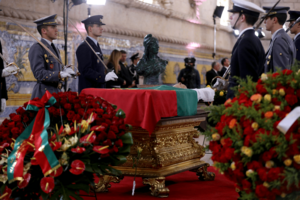
Mário Soares passed away on January 7, 2017, at the age of 92. He had been in the hospital since December 13 and fell into a coma from which he did not recover. The Portuguese Government held a state funeral for him and declared three days of national mourning. This was the first state funeral in Portugal since 1951. His remains were buried in the Prazeres Cemetery in Lisbon, next to his wife.
Mário Soares is remembered as a key figure in Portugal's journey from dictatorship to democracy. His efforts helped shape modern Portugal and its place in Europe.
Honours and Awards
Mário Soares received many honours and awards from Portugal and other countries for his important work and contributions.
National Honours (Portugal)
 Grand Collar of the Order of the Tower and Sword (1991)
Grand Collar of the Order of the Tower and Sword (1991) Grand Cross of the Order of Christ (1981)
Grand Cross of the Order of Christ (1981) Grand Collar of the Order of Liberty (1996)
Grand Collar of the Order of Liberty (1996) Grand Master of the Portuguese Orders (1986–1996)
Grand Master of the Portuguese Orders (1986–1996)
Foreign Honours (Other Countries)
 Grand Cross of the Order of Merit of the Austrian Republic (Austria, 1987)
Grand Cross of the Order of Merit of the Austrian Republic (Austria, 1987) Grand Cross and Grand Collar of the Order of the Southern Cross (Brazil, 1987)
Grand Cross and Grand Collar of the Order of the Southern Cross (Brazil, 1987) Order of the Balkan Mountains with Ribbon (Bulgaria, 1994)
Order of the Balkan Mountains with Ribbon (Bulgaria, 1994) 1st Class of the Order of Amílcar Cabral (Cape Verde, 2001)
1st Class of the Order of Amílcar Cabral (Cape Verde, 2001) Collar of the Grand Cross of the Order of Merit (Chile, 1992)
Collar of the Grand Cross of the Order of Merit (Chile, 1992) Grand Cross of the Order of the Dannebrog (Denmark, 1988)
Grand Cross of the Order of the Dannebrog (Denmark, 1988) Knight of the Order of the Elephant (Denmark, 1992)
Knight of the Order of the Elephant (Denmark, 1992) Collar of the Order of the Nile (Egypt, 1992)
Collar of the Order of the Nile (Egypt, 1992) Grand Cross of the Order of the White Rose of Finland with Collar (Finland, 1990)
Grand Cross of the Order of the White Rose of Finland with Collar (Finland, 1990) Grand Cross of the Legion of Honour (France, 1990)
Grand Cross of the Legion of Honour (France, 1990) Grand Cross Special Class of the Order of Merit of the Federal Republic of Germany (Germany, 1991)
Grand Cross Special Class of the Order of Merit of the Federal Republic of Germany (Germany, 1991) Grand Cross of the Order of the Redeemer (Greece, 1987)
Grand Cross of the Order of the Redeemer (Greece, 1987) Collar of the Order of Pope Pius IX (Holy See, 1991)
Collar of the Order of Pope Pius IX (Holy See, 1991) Grand Cross with Collar of the Order of Merit of the Italian Republic (Italy, 1989)
Grand Cross with Collar of the Order of Merit of the Italian Republic (Italy, 1989) Knight of the Order of the Gold Lion of the House of Nassau (Luxembourg, 1988)
Knight of the Order of the Gold Lion of the House of Nassau (Luxembourg, 1988) Knight Grand Cross of the Order of the Netherlands Lion (Netherlands, 1991)
Knight Grand Cross of the Order of the Netherlands Lion (Netherlands, 1991) Grand Cross of the Order of St. Olav (Norway, 1987)
Grand Cross of the Order of St. Olav (Norway, 1987) Grand Cross of the Order of Polonia Restituta (Poland, 1994)
Grand Cross of the Order of Polonia Restituta (Poland, 1994) Grand Cross and Collar of the Order of Charles III (Spain, 1988)
Grand Cross and Collar of the Order of Charles III (Spain, 1988) Knight of the Order of the Seraphim (Sweden, 1987)
Knight of the Order of the Seraphim (Sweden, 1987) Honorary Knight Grand Cross (with Collar) of the Order of the Bath (United Kingdom, 1994)
Honorary Knight Grand Cross (with Collar) of the Order of the Bath (United Kingdom, 1994) Honorary Knight Grand Cross of the Order of St Michael and St George (United Kingdom, 1996)
Honorary Knight Grand Cross of the Order of St Michael and St George (United Kingdom, 1996) Grand Collar of the Order of the Liberator (Venezuela, 1987)
Grand Collar of the Order of the Liberator (Venezuela, 1987)
Other Awards and Recognitions
- In 1998, Soares won the International Simón Bolívar Prize from UNESCO.
- In 2000, he received the North-South Prize from the Council of Europe.
- He was an honorary member of the Club of Rome.
- He was awarded an honorary Doctor of Laws degree by the University of Leicester in 1994.
Electoral Results
1986 Portuguese Presidential Election
Mário Soares won this election with 3,010,756 votes (51.18%) after a second round of voting.
1991 Portuguese Presidential Election
Mário Soares won this election with 3,459,521 votes (70.35%).
2006 Portuguese Presidential Election
Mário Soares finished third in this election with 785,355 votes (14.31%).
See also
 In Spanish: Mário Soares para niños
In Spanish: Mário Soares para niños
 | Anna J. Cooper |
 | Mary McLeod Bethune |
 | Lillie Mae Bradford |


